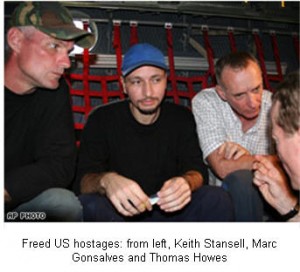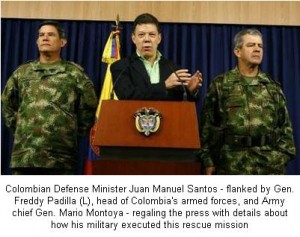 By all accounts, last week’s rescue of former Colombian presidential candidate Ingrid Betancourt, three American soldiers and other hostages (15 in all) was a triumph of military brains over guerrilla brawn. Never mind that, if it had failed, it would have been ridiculed as a stunt more worthy of a Hollywood script than military strategy.
By all accounts, last week’s rescue of former Colombian presidential candidate Ingrid Betancourt, three American soldiers and other hostages (15 in all) was a triumph of military brains over guerrilla brawn. Never mind that, if it had failed, it would have been ridiculed as a stunt more worthy of a Hollywood script than military strategy.
They were being held by the Revolutionary Armed Forces of Colombia (FARC). FARC is generally recognized as a rag-tag bunch of military misfits who spout discredited communist platitudes as the clarion call for their ongoing, 50-year insurrection.
 However, FARC has done little to engage the Colombian military. Instead, it has become a menace to society by kidnapping thousands of civilians for ransom every year to help fund its quixotic war. In fact, previous governments were so intimidated by its ruthlessness that FARC was able to extract all manner of concessions, including a 42, 000 sq. kilometer safe haven in 1998 from then President Andres Pastrana.
However, FARC has done little to engage the Colombian military. Instead, it has become a menace to society by kidnapping thousands of civilians for ransom every year to help fund its quixotic war. In fact, previous governments were so intimidated by its ruthlessness that FARC was able to extract all manner of concessions, including a 42, 000 sq. kilometer safe haven in 1998 from then President Andres Pastrana.
Yet, what truly distinguishes FARC is its involvement in the Colombian drug trade. Specifically, it has established a veritable business district for the production and shipment of cocaine in its “protected” areas. And, as the de facto government authority, FARC collects a fee at every stage of this enterprise – from taxing the chemicals used to process coca to charging traffickers to use its airstrips. Reports are that FARC rakes in over $300 million annually from drugs alone.
Nevertheless, chances are very good that, but for kidnapping Betancourt, FARC would have been left to continue its activities with immunity and in relative obscurity. Although, it had already incited considerable wrath amongst Colombian authorities for trying to assassinate new president, Alvaro Uribe, as he campaigned for the presidency in 2002.
At any rate, this rescue mission reportedly began with Colombian military officers being trained – complete with “Hollywood-style acting lessons” – by American special forces to infiltrate FARC. And its execution required nothing more than these undercover officers duping FARC into entrusting the transport of Betancourt and others from one rebel camp to another. Once airborne, however, they were flown to freedom.
 Alas, the admitted involvement of US soldiers diminished the purported heroism of the Colombians.
Alas, the admitted involvement of US soldiers diminished the purported heroism of the Colombians.
In fact, within days, published reports indicated that the rescue of Betancourt was merely incidental to a CIA operation to recover the three Americans who were seized in 2003 after their plane crashed on a spy mission over FARC territory.
Other reports suggested that this was nothing more than a typical FARC business transaction involving the exchange of hostages for a Yankee ransom.
Frankly, no matter the truth about how they were freed, I am happy for the hostages who have now been reunited with their loved ones.
I am constrained to wonder though about the fate of hundreds of other FARC hostages who have been in captivity even longer than the celebrated Betancourt. Indeed, the irony is that Betancourt was captured while campaigning on a defiant pledge to rescue them.
So never mind who gets credit for the release of these 15 hostages. Because the real question is what is the Colombian government going to do, if anything, to secure the release of the hundreds who remain captive…?
 Alas, I suspect Betancourt will probably become president of Colombia before another rescue mission is even contemplated:
Alas, I suspect Betancourt will probably become president of Colombia before another rescue mission is even contemplated:
I have come to the conclusion that I probably will return to politics, because it is my destiny.
[Ingrid Betancourt to Semana magazine on Sunday]
Talk about riding a wave of emotion and seizing the moment. But the Nobel Peace Prize…?
I will immediately begin vigorously pushing her candidacy for the Nobel Peace Prize.
[Chilean President Michelle Bachelet]
But surely Terry Waite is more deserving. After all, he was already famous for negotiating the release of Western hostages in Iran and Libya when he was kidnapped in 1987 by terrorists in Beirut, and held captive for almost five years….
Related Articles:
Latin America’s first female head of state: Michelle Bachelet of Chile
Leave a Reply
You must be logged in to post a comment.